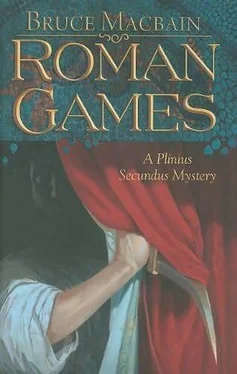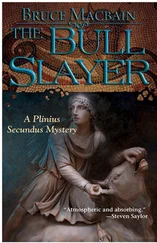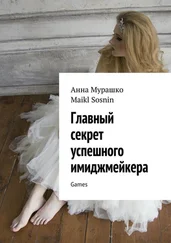Bruce Macbain - Roman Games
Здесь есть возможность читать онлайн «Bruce Macbain - Roman Games» весь текст электронной книги совершенно бесплатно (целиком полную версию без сокращений). В некоторых случаях можно слушать аудио, скачать через торрент в формате fb2 и присутствует краткое содержание. Жанр: Исторический детектив, на английском языке. Описание произведения, (предисловие) а так же отзывы посетителей доступны на портале библиотеки ЛибКат.
- Название:Roman Games
- Автор:
- Жанр:
- Год:неизвестен
- ISBN:нет данных
- Рейтинг книги:3 / 5. Голосов: 1
-
Избранное:Добавить в избранное
- Отзывы:
-
Ваша оценка:
- 60
- 1
- 2
- 3
- 4
- 5
Roman Games: краткое содержание, описание и аннотация
Предлагаем к чтению аннотацию, описание, краткое содержание или предисловие (зависит от того, что написал сам автор книги «Roman Games»). Если вы не нашли необходимую информацию о книге — напишите в комментариях, мы постараемся отыскать её.
Roman Games — читать онлайн бесплатно полную книгу (весь текст) целиком
Ниже представлен текст книги, разбитый по страницам. Система сохранения места последней прочитанной страницы, позволяет с удобством читать онлайн бесплатно книгу «Roman Games», без необходимости каждый раз заново искать на чём Вы остановились. Поставьте закладку, и сможете в любой момент перейти на страницу, на которой закончили чтение.
Интервал:
Закладка:
“Recline here by me in the place of honor. I’ve long wanted to meet you, in fact. I’m a bit of a poet myself actually. Oh, I don’t publish. Just for my own amusement.”
The slaves brought honeyed wine and Pliny poured the customary libation to the Lares and Penates.
Martial gave him an appraising look. “You don’t include the emperor’s bust among your household gods?”
Pliny’s hand froze for an instant. Without looking at the poet, he said, “Do you?” Then they measured each other with their eyes. “Of course, I worship him-” they both said at once. Then both stopped. Then both smiled. It was a delicate, dangerous moment. Either one of them might have been a spy. “We must serve the emperor we have,” said Pliny carefully.
“Indeed we must,” said Martial. The moment passed. It would be all right.
While slaves carried in the first course, Pliny introduced his freedmen; there were three of them reclining on one couch. “This is Zosimus,” he indicated a thin, serious young man in his twenties. “He is my secretary and my most gifted Greek reader, and my trusted friend. And this is-but, ah, here she comes now!”
Leaning on her nurse’s arm, the heavily pregnant girl came into the room and eased herself onto the dining couch beside her husband.
Well, here’s a tasty morsel, thought Martial. Though his preference ran mostly to the other thing, the poet was an admirer of feminine beauty. He noted her lustrous dark eyes and her swelling breasts.
For her part, Calpurnia didn’t know what to make of this shaggy bear of a man with his flashing teeth and rolling eye. He was certainly unlike any other of her husband’s friends, being rather what she imagined an aging pirate might look like. She struggled with her shyness and risked a smile. “I am pleased to meet any friend of my husband’s. Are you new to our city?”
Though you would not have guessed it from his poems, Martial had a charming manner with women. He made her a low bow, then laughed. “I come from gold-bearing Tagus, from high-girt Bilbilis and the banks of rugged Salo, in short, from Spain. I came to Rome to seek fame and fortune as a writer, and Rome has grizzled my locks.” He raked his fingers through his hair. “The noise, the distractions drive me wild, and yet I can’t break away. The city gets in your blood. And though I am read all over Rome, nay, all over the Empire, it brings me no money. Fortune still eludes me.”
“You wish to be known at court, my friend?” Pliny broke in.
“That is my desire, sir.” The poet put on his serious face. “I’ve sent trunksful of verse up to the palace. I’ve praised the worthy Parthenius, I even dedicated half a dozen poems to little Earinus, though I blush to admit it.”
“You know your language is rather, ah, indelicate for the ears of this chaste court.”
“I’ve been told so once already today by that old fart Statius,” the poet replied. “However, I’ve lately written a whole book of poems praising the emperor, and all without a single word that would make your maiden aunt squirm. But I need someone to actually put it in his hands, don’t you see? I halfway believe that Statius intercepts my offerings.”
“Papinius Statius,” said Pliny stiffly, “happens to be a very dear friend of mine. I assure you, your suspicions are absurd. Nevertheless, when this Verpa business is over I’ll see what I can do for you.”
“I would be forever grateful, Patrone.”
“Now, now, no such word as that between us. You must consider me a friend.”
The first course was served and cleared away. During the interval Pliny urged his young wife to recite for them. “I mean if you’re feeling up to it, my dear. It’s her pregnancy,” he said in an aside to Martial, “she’s under doctor’s orders not to tire herself. Still, if you would…” He gazed at her hopefully. “I mentioned I write verses. Calpurnia sets them to music and accompanies herself on the lyre, with no schooling from a music teacher, but with affection, which is the best possible teacher.”
Martial steeled himself. Clearly, the pompous man was dying to show off his verses and show off his child wife too.
The verses were pedestrian, but she was charming. She sang in a light, girlish voice while her fingers plucked complex patterns on the strings, and all the while her husband beamed at her with indescribable complacency.
“Bravo!” Martial clapped his hands when she had finished. “Why, mistress, put my verses to music and you’ll make my fortune for me!”
She blushed. “My talent is small, sir, but it is at your service. Tell me, what meters do you employ? For the lyre I find that iambic trimeter works best, although the dactylic, of course-”
“Calpurnia?” Pliny ’s face was a picture of baffled embarrassment.
“Why, husband, what is the matter?” She raised an innocent eyebrow. “I must ask him, mustn’t I?” Martial caught a gleam of amusement in her eye and an answering one from the freedman, Zosimus across the table. Well, well, thought Martial, this young lady has been taking lessons, and not only from Cupid. And now she’s teasing him. Here’s a girl with more spirit than she’s given credit for.
They spent the next few minutes discussing Latin lyric meters and the poet was impressed, both by her knowledge and by her tact in drawing her husband back into the conversation and smoothing his ruffled feathers. Meanwhile more dishes were brought out-filling, if not exciting. Presently Calpurnia stifled a yawn and excused herself.
“You chose wisely, my friend,” said Martial when she was gone, and meant it. “She’s charming. I’ve been in half the bedrooms in Rome, but I’ve no one to go home to tonight. It’s no life for a man my age.”
“She is devoted to me, the dear thing.” Pliny was moist-eyed. “She memorizes my courtroom speeches, you know; even sleeps with a sheaf of them beside her on the bed when I have to be away from home.”
“No, really?” said Martial. He had to bite his lip to keep from laughing. “But when you’re lucky enough to be in the bed, she’s not, ah, too modest, I hope.”
“Oh, goodness no,” Pliny assured him. Lately, of course, because of the fear of a miscarriage, they had been abstaining. Pliny had a more ardent nature than many would have suspected and he was beginning to feel quite definitely deprived.
Leaving the subject of his host’s marital bliss, Martial ventured, “This murder case you’re on…”
“ Mehercule,” Pliny burst out with feeling, “I don’t know why this business has been thrust upon me. The babe unborn has as much knowledge of crime detection as I do. I’m no more a policeman than you are.”
“But it is of some interest,” the poet replied. “What little I’ve gathered from the barber shop gossip. What have you learned so far?” Pliny described his morning’s investigation. “Jewish assassins,” said the poet. “And you believe it?” “Well, I mean to say, the evidence all points that way. I only hope I can save the other slaves.”
“You actually care about them, don’t you? It does you credit. I once composed an epitaph in verse for a little slave girl who died on our estate back home. A dear little thing. I’m not all winks and nudges, you know.”
Pliny affirmed that he was glad to hear it.
The poet made a temple of his fingers and rested his chin on them. “You knew Verpa, of course.”
“Only slightly, and his wretched family not at all. Lucius seems to be a typical young man of our age, that is to say good for nothing. And as for the lady, she is either a mad woman or she’s afraid of something. Her behavior this morning was extraordinary.”
“You don’t say. Well, I can tell you that our Lucius has been living far beyond his allowance; gambled and whored it all away-reminds me of myself when I was his age. I’ve learned that half a dozen usurers are pursuing him and have threatened to cut off his credit or even complain to his father if he doesn’t pay up.”
Читать дальшеИнтервал:
Закладка:
Похожие книги на «Roman Games»
Представляем Вашему вниманию похожие книги на «Roman Games» списком для выбора. Мы отобрали схожую по названию и смыслу литературу в надежде предоставить читателям больше вариантов отыскать новые, интересные, ещё непрочитанные произведения.
Обсуждение, отзывы о книге «Roman Games» и просто собственные мнения читателей. Оставьте ваши комментарии, напишите, что Вы думаете о произведении, его смысле или главных героях. Укажите что конкретно понравилось, а что нет, и почему Вы так считаете.












